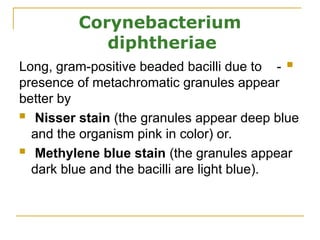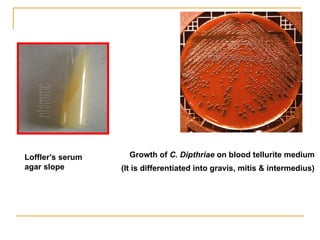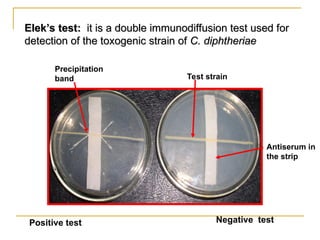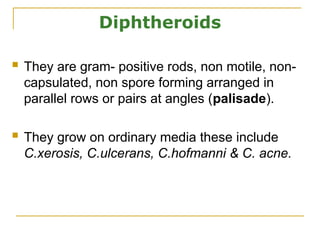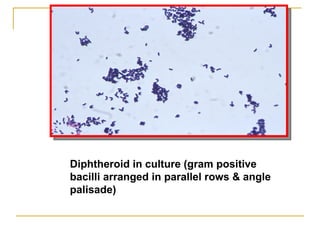Corynebacteria species short notes on ppt
- 1. Corynebacteria - This genus includes: - Pathogenic Corynebacterium ; C.diphtheriae. - - Commensal Corynebacterium in skin& mucous membrane; Diphtheroids.
- 2. Corynebacterium diphtheriae ’ü« - Long, gram-positive beaded bacilli due to presence of metachromatic granules appear better by ’ü« Nisser stain (the granules appear deep blue and the organism pink in color) or. ’ü« Methylene blue stain (the granules appear dark blue and the bacilli are light blue).
- 3. ’ü« They are non-motile, non-capsulated& have Chinese letter arrangement. ’ü« It grows on LofflerŌĆÖs serum at 37╦ÜC/ 24 h. ’ü« On blood tellurite agar, the organism can be differentiated into, mitis& intermedius types (grey to black colonies).
- 4. C. Diphtheriae with methylen blue stain C. Diphthriae (Gram positive bacilli have Chinese letter arrangement)
- 5. Growth of C. Dipthriae on blood tellurite medium (It is differentiated into gravis, mitis & intermedius) LofflerŌĆÖs serum agar slope
- 6. Positive test Negative test ElekŌĆÖs test: ElekŌĆÖs test: it is a double immunodiffusion test used for it is a double immunodiffusion test used for detection of the toxogenic strain of detection of the toxogenic strain of C. diphtheriae C. diphtheriae Precipitation band Test strain Antiserum in the strip
- 7. Diphtheroids ’ü« They are gram- positive rods, non motile, non- capsulated, non spore forming arranged in parallel rows or pairs at angles (palisade). ’ü« They grow on ordinary media these include C.xerosis, C.ulcerans, C.hofmanni & C. acne.
- 8. Diphtheroid in culture (gram positive bacilli arranged in parallel rows & angle palisade)

